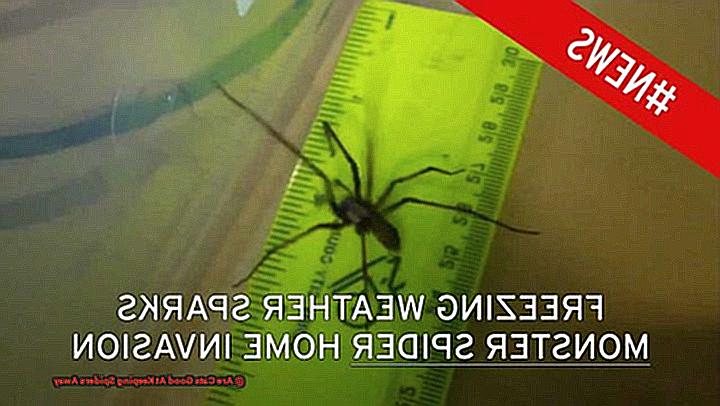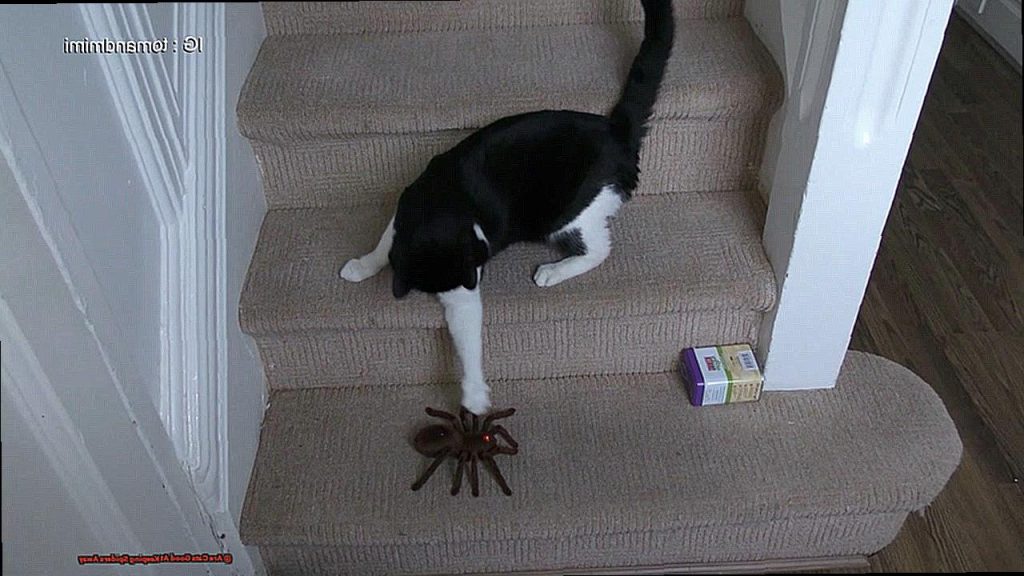The mere thought of them can send shivers down your spine and make you do a little dance of fear. But what if I told you that there’s a potential solution to keep these eight-legged creatures at bay?
And no, it’s not some fancy gadget or expensive exterminator – it’s our furry friends, cats. As someone who has a deep aversion to spiders, I’ve done my fair share of research and can confirm the effectiveness of feline pest control.

Trust me, if you want to sleep soundly without any creepy crawlers lurking in the shadows, keep reading.”
Are Cats Good At Keeping Spiders Away?
Contents
Many people believe that cats have the ability to keep pests and insects away, but when it comes to spiders, the answer is not as simple. As an expert on the topic of cats and spider control, let me break it down for you.
Types of Spiders That Invade Homes
First things first, it’s important to understand the types of spiders that commonly invade homes. There are two main types: web-building spiders and hunting spiders. Web-building spiders, like the common house spider, build webs to catch their prey while hunting spiders, like the wolf spider, actively search for their food. This distinction is crucial in determining whether cats can effectively keep them away.
Do Cats Have a Natural Ability to Keep Spiders Away?
Cats are known for their hunting abilities and are natural predators. They have a strong instinct to chase and catch small moving objects, making them potential spider hunters. However, cats tend to focus on smaller prey such as mice and insects, and may not be as effective in catching larger spiders.
Furthermore, many cats are actually afraid of spiders themselves. This fear may stem from their instinctual knowledge that some spiders are venomous and can be dangerous. This fear can also be passed down from their mother as they observe her avoiding certain insects or animals.
Cats vs. Spiders: The Hunt
While some cat owners have reported that their feline companions have successfully caught and killed spiders in their homes, this may be true for smaller spiders or those caught in webs. However, larger hunting spiders may prove to be more difficult for cats to catch.
Benefits of Having a Cat for Spider Control
It’s not all bad news though. Cats have some benefits when it comes to pest control. Their presence alone can deter some pests from entering the home, as they emit a pheromone that scares away rodents and insects. In addition, cats are known for their grooming habits and may accidentally ingest some spiders while cleaning themselves. This can help reduce the spider population in the home, but it is not a guarantee that all spiders will be eliminated.
What Else Can You Do?
While cats may not be the most effective solution for keeping all types of spiders away, there are other measures you can take to prevent them from entering your home. Here are some tips:
Breeds That May Be Less Interested in Hunting Spiders
If you’re a cat owner, you may have heard that these feline companions have a natural ability to keep spiders away. While this may be true for some cats, it’s not a guarantee for all breeds.
In fact, there are certain breeds of cats that may not have a strong inclination towards hunting spiders due to their laid-back personalities and preference for lounging and grooming. Let’s take a closer look at these breeds and why they may not be as interested in chasing and catching spiders.
Persian Cats: Lounging Royalty
Known for their luxurious long fur and quiet demeanor, Persian cats are often considered to be the epitome of the ultimate lap cat. These cats tend to be more interested in lounging around and getting pampered than actively seeking out insects. Their gentle and calm nature may make them less likely to engage in the thrill of the hunt.
Ragdoll Cats: Gentle Giants
Ragdoll cats are another breed known for their relaxed and docile personalities. They are often described as “floppy” due to their tendency to go limp when picked up, making them less likely to actively chase after spiders. These gentle giants would much rather spend their time snuggling with their owners than going on a bug hunt.
Siamese Cats: Vocal and Inquisitive
While Siamese cats may have a reputation for being loud and talkative, they are also highly intelligent and curious creatures. However, their curiosity may not extend to hunting spiders. These vocal felines are more likely to use their voices to demand attention from their owners than to chase after insects.
Birman Cats: Laid-Back and Affectionate
Birman cats are another breed known for their calm and affectionate nature. They are often content lounging around and being petted by their owners. Their gentle demeanor and preference for human interaction may make them less inclined to hunt spiders.
Remember, Individuality Matters
It’s important to keep in mind that each cat is an individual and may have different preferences and behaviors, regardless of their breed. Some cats that are typically not considered “hunting” breeds may surprise their owners by showing a strong interest in chasing and catching spiders. So even if you have a Persian, Ragdoll, Siamese, or Birman cat, don’t be too quick to dismiss their potential as spider hunters.
How a Cat’s Sense of Smell Helps in Spider Detection
If you’re a cat owner, you know that your furry friend is an expert at finding and catching those pesky insects that invade your home. But have you ever wondered how they do it? It’s not just their quick reflexes and sharp claws, but their sense of smell that plays a crucial role in their hunting abilities.
Cats have a remarkable sense of smell, with about 200 million odor-sensitive cells in their noses compared to our mere 5 million. This heightened sense of smell helps them detect scents that we can only imagine. But how does this help in spider detection?
Well, spiders produce pheromones – chemicals that they release to communicate with other spiders and attract potential prey. These pheromones are like a dinner bell for cats, who are able to pick up on them and use them to track down and hunt spiders.

But it’s not just their sense of smell that aids in spider detection. Cats also have incredibly sensitive whiskers and hairs on their faces, legs, and bodies that help them detect even the slightest movements in their surroundings. This allows them to sense the vibrations produced by spiders as they move around, making it easier for cats to locate and catch them.
And let’s not forget about their keen sense of hearing. Some spiders produce sounds through vibrations or rubbing their body parts together, and cats are able to hear these sounds even at a distance. This helps them pinpoint the location of a spider and go after it with precision.
But not all cats have the same level of effectiveness when it comes to detecting spiders. Some breeds, like Siamese and Burmese cats, have been known to have a stronger sense of smell than others. And cats who spend more time outdoors tend to have better hunting skills and therefore may be more efficient at detecting spiders.
The Agility of Cats and Their Ability to Reach High Places Where Spiders Hide
Cats are natural climbers and jumpers, with their flexible bodies and strong hind legs allowing them to navigate through any environment with ease. But did you know that this agility also makes them skilled spider-hunters?
Cats are known for their exceptional hunting abilities, and this includes their talent for catching spiders. These eight-legged pests often hide in high corners or on ceilings, making it difficult for us humans to reach them. But not for cats. With their natural agility and jumping prowess, cats have a significant advantage when it comes to catching spiders.
Their strong hind legs provide them with the power and force needed to propel themselves into the air, while their flexible bodies allow them to twist and turn mid-jump. This allows them to reach high shelves, furniture, and even climb up walls without breaking a sweat. And let’s not forget about their sharp claws, which aid in their grip on surfaces as they make their way towards their prey.
In fact, according to a study published in the Journal of Experimental Biology, cats can jump up to six times their body length in a single leap. Just imagine the height they can reach. This impressive jumping ability gives them a significant advantage in catching prey like spiders, which often try to escape by climbing high.
But it’s not just their physical abilities that make cats skilled spider-hunters. They also have heightened senses that come into play when tracking down these creepy crawlies. Cats have a keen sense of smell, sensitive whiskers and hairs, and excellent hearing, all of which help them detect and catch spiders with precision and efficiency.
The Presence of Cats as a Deterrent for Spiders
While there is limited scientific evidence to support the claim that cats are effective at keeping spiders away, many cat owners swear by their furry companions’ abilities to control spider populations in their homes. But how exactly do cats deter spiders? Let’s take a closer look.
The “Venomous” Factor:
One theory is that cats may instinctively avoid spiders due to their venomous nature. After all, cats are smart creatures and know to stay away from potential threats. This could explain why they may not actively hunt down spiders like they do with other prey.
Intimidation Tactics:
But it’s not just their instincts that make cats effective at keeping spiders away. The mere presence of a cat can be enough to intimidate spiders and discourage them from entering a home. The scent and noises produced by cats can be intimidating to spiders, causing them to seek shelter elsewhere.
Outdoor Cats as Barriers:
Outdoor cats can also act as barriers against spiders. As they roam around the perimeter of a home, they create a natural barrier that keeps spiders at bay. So if you have an outdoor cat, consider yourself lucky – they may be doing more than just lounging in the sun all day.
Fastidious Groomers:
Another factor to consider is that cats are fastidious groomers. They constantly clean themselves, which may remove any spider webs or nests that may be present in their vicinity. This makes them not only great for controlling spider populations, but also for maintaining a clean and tidy home.
Nimble Hunters:
Cats’ natural agility and impressive jumping abilities make them skilled spider-hunters. Their sharp claws and excellent dexterity allow them to reach into nooks and crannies where spiders may hide. So if you see your cat pawing at a corner or jumping at a wall, they may be on the hunt for some eight-legged prey.
Breed Differences:
It’s important to note that not all cats will have the same level of effectiveness in deterring spiders. Some breeds may have a higher prey drive while others may be more skittish around bugs. So while owning a cat may help with your spider problem, don’t expect them to completely eliminate it.
Grooming Habits: How Cats Help Remove Spider Webs and Eggs
Cats are known for their graceful movements, adorable antics, and undeniable cuteness. But did you know that they are also natural experts at removing spider webs and eggs from their living space? Yes, you heard that right – your furry friend may just be the solution to your spider woes.
As a cat owner, you may have noticed your feline companion exhibiting some peculiar behaviors, such as pawing at walls or corners, or even munching on something invisible.
These seemingly strange actions are actually a part of their natural grooming habits, which help them keep their environment clean and free from pesky spider webs and eggs.
But how exactly do cats manage to remove these unwanted pests from their living space? Let’s take a closer look at their unique grooming habits.
Rough Tongue with Tiny Hooks
Cats’ tongues are not like ours – they are covered in tiny hooked papillae that serve as a comb for their fur. This rough texture helps them remove debris and dirt from their coat, but it also plays a crucial role in removing spider webs and eggs from surfaces.
As cats groom themselves, these tiny hooks catch onto the silk strands of spider webs and easily remove them from walls, ceilings, and other surfaces.
Sharp Claws for Destruction
In addition to their rough tongues, cats also have sharp claws that can easily tear through spider webs and destroy spider eggs. This is due to their natural hunting instincts – in the wild, cats use their claws to catch prey and defend themselves. So when they encounter spider webs and eggs in their living space, they instinctively use their claws to get rid of them.
Keen Sense of Smell
Cats have a highly developed sense of smell, which helps them detect the presence of spiders and their webs. They may actively seek out and remove spider webs and eggs as part of their territory marking behavior. By spreading their scent around their living space through grooming, they are essentially marking their territory and keeping spiders at bay.
Drawn to Vibrations
Some experts believe that cats may also be drawn to the vibrations produced by spiders in their webs. As cats are natural hunters, they may perceive these vibrations as a potential prey and pounce on the webs to remove them. This behavior is similar to how they play with toys or chase after insects – it’s all part of their innate instincts.
The Role of Felinine in Repelling Insects, Including Spiders
If you’re a cat owner, you know that cats are not only great companions but also natural hunters and defenders of their territory. But did you know that your cat’s urine contains a chemical compound called felinine that can serve as a natural insect repellent, including spiders? In this post, we’ll delve into the world of felinine and its role in keeping spiders away from your home.
What is Felinine and How Does it Work?
Felinine is a chemical compound found in cat urine, specifically in the urine of male cats. It is produced by the breakdown of amino acids in the liver and is responsible for the strong odor of cat urine. But aside from its distinctive smell, felinine also has insect-repelling properties.
Researchers believe that felinine’s sulfur content is what makes it an effective insect repellent. Sulfur is known to repel insects, and the sulfur compounds in felinine may be similar to those found in some insect repellents. This explains why spiders and other insects tend to steer clear of areas with a strong presence of felinine.
Why Cats Produce Felinine
Cats have evolved to produce felinine as a way to mark their territory and communicate with other cats. This means that even indoor cats who do not go outside or hunt can still have a strong presence of felinine in their urine, potentially keeping spiders away.
However, it’s worth noting that not all cats produce felinine in their urine. This is dependent on their genetics and diet, so not all cats may have the same effectiveness in repelling insects.
Other Factors to Consider
While felinine may help to keep spiders away, it may not completely eliminate them from a household. Other factors such as cleanliness and access points for spiders can also play a role in their presence. As a responsible cat owner, it’s important to maintain a clean living environment and seal off any entry points for spiders to prevent infestations.
The Role of Cats’ Behavior
Aside from the presence of felinine, cats’ behavior may also contribute to keeping spiders away. Cats are natural predators and their presence alone can deter insects from entering a household. Their keen sense of smell and sharp claws can also help in catching and dispatching any insects that do make their way inside.
Conclusion
In summary, while spiders may be a common fear for many, cats have the potential to be effective in keeping them away. As we’ve delved into throughout this article, cats possess innate abilities and behaviors that make them natural spider hunters and deterrents. Whether it’s their sharp sense of smell, impressive agility, or meticulous grooming habits, these feline friends have the tools to detect and remove spiders from their living space.
Moreover, the presence of felinine – a chemical compound found in cat urine – can serve as a natural barrier against insects, including spiders. However, it’s important to note that felinine alone may not completely eliminate spiders from a household. Other factors such as cleanliness and access points for spiders also play a role in their presence.
So, if you want to sleep soundly without any unwanted eight-legged visitors, look no further than your furry companion. Their mere presence can act as a deterrent for insects, while their innate hunting instincts and grooming rituals make them skilled spider-hunters.






